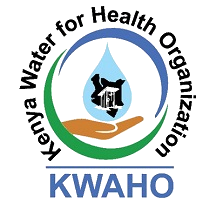Women bear the brunt of providing their communities with water, walking for miles each day to fetch water. In spite of their central role, women rarely have a voice in water supply and management schemes. Instead, they take on an unequal share of domestic tasks within their households, and spend a staggering amount of time fetching water from distant, disease-prone and often dangerous places.
Rabecca Odhiambo a mother of five and a CHV from Sondu Akiayi Boresha unit community narrates a story of their journey to clean and safe water. “Before Project’s intervention of Maji Safi, I used to endure 3km walk to the main water source – the river Miriu, to fetch water for use by her family. I barely had any source of income, except supporting people in their farms to earn some small payments and sometimes doing laundry work which was also a challenge, due to lack of water and also distance covered was strenuous.”
“Life has changed with the successful completion of water facilities at Sondu Maji Safi Kiosk community. The water project has really improved the health and livelihood of people living in this area especially my household. Our life has been enriched and we no longer suffer from water-borne diseases as was in the past. We have also developed a habit of using clean water and washing hands with soap after using the latrines or before cooking as taught by our facilitators from KWAHO.”
There is greater demand for water by Sondu community especially un intended beneficiaries from the surrounding villages. The demand represent a thriving water market that has brought about enormous and greater opportunities to community beneficiaries, especially water vendors who are meeting an important gap by travelling by cats and motorbikes to supply water to individuals, local businesses and institutions that are far from the kiosks.
So when Rebecca saw the opportunity, she too decided to start up a small business of water vending. On average, Rebecca says that she makes 6 trips to the water kiosk with her 12 Jerricans cart on a daily basis. At the kiosk she purchases 20 liters for Ksh.5 and reaching her destination, resells the water at Ksh.10 per 20 liters jerrican depending on distance covered and season.
“We have big plans for the Project and we are still expecting an incredible change from this water project. We have only come this far thanks to God and the amazing people from Siemens and KWAHO. May God bless you.”



Comments